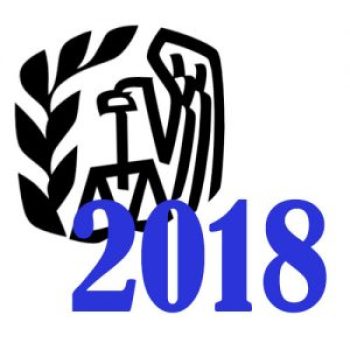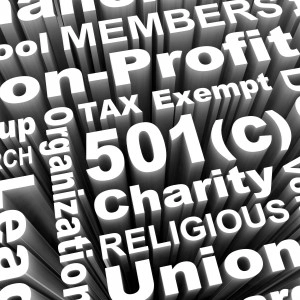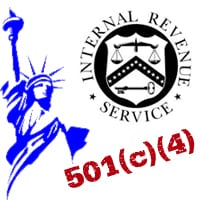Interested to learn who the donors are for a nonprofit organization? You might find it on Schedule B, the Schedule of Contributors, attached to the Form 990 annual tax return for tax-exempt organizations, which is made available to the public. But that’s not likely, as before the IRS makes the form publicly accessible, the names and addresses of the substantial donors that are provided on the form are redacted. But all that will change when under a new procedure the IRS has put in place, not only will the public remain in the dark about a nonprofit’s contributors – so will the IRS.
On July 16, 2018, the IRS issued Revenue Procedure 2018-38. Under the pending rule modification, many nonprofits, including 501(c)(4), (5), and (6) organizations, that must include the donor information on Schedule B will no longer be required to do so. (Other organizations formed under Section 501(c)(3) or Section 527 will still need to provide it on Schedule B.) The change takes effect for tax years ending on or after December 31, 2018. The move by IRS to limit its collection of contributor information has been met with both cheers and jeers, which I summarize below.
Cheers
In the eyes of those supporting the change to the reporting requirements, the collection of contributor information represents a chilling of free speech and a donor’s right of association and privacy. The supporters also point to the IRS’ occasional inadvertent disclosure of donor information, making the case that removing the requirement to submit it will further insure protection of the contributors’ speech and privacy rights. The argument is also made that the IRS has no need for the information except in the case of an audit. For its part, the IRS reasons that the reporting and redacting of donor information is a waste of time and resources for both the agency and nonprofits.
Jeers
Critics of the move argue that the IRS is inviting additional improper funding into so called “dark money” groups (such as 501(c)(4) organizations) which have become increasingly active in American elections since the Citizens United Supreme Court decision in 2010. Since donors to these groups already avoid much of the public disclosure required of traditional political organizations, the fear is that the new rule invites abuse of existing campaign finance laws, including foreign contributions. Critics are also quick to point out that the IRS’ change came on the same day news outlets reported an arrest of a Russian national accused of attempting to improperly influence American politics through, among other things, the influence of U.S. nonprofit organizations.
Further, the adversaries note that inadvertent disclosures made by the IRS of protected information have been rare and do not appear to have chilled the free speech activity of those organizations. As to the IRS’ rationale that its rule change protects limited resources, they counter that the Schedule B change will increase initial investigatory costs as the request for donor information will have to be assessed and handled on a case-by-case basis. When the IRS needs to audit an organization’s financials, it will create even more work for IRS agents and nonprofits and could result in more frequent and invasive audits.
States Seek to Shine a Light on Dark Money
The new rules by the IRS may be made less relevant by state legislatures. New York, as an example, recently enacted a statute requiring both 501(c)(3) organizations (public charities and private foundations) who provide support to 501(c)(4) organizations (advocacy organizations) in excess of $2,500 in any six month period, regardless of the purpose and the form of that support, to reveal its major donors on a public website established by the Attorney General’s office. In addition, the new law requires that 501(c)(4)s that expend more than $10,000 in any one year on broadly communicated lobbying type activities also report their donors on the Attorney General’s public website. (For a more in-depth discussion see: Shining a Light on Dark Money: Floodlight or Flashlight ). Although they are unlikely bedfellows, Citizen’s United and the ACLU have each challenged the new statute, resulting in a stay of its implementation.
Practical Effect
One thing the supporters and critics agree on is that IRS rarely uses the contributor information it currently collects, and nonprofits will still be required to keep records of their donations. The rules regulating the nonprofit sector are under-enforced at the federal level. State charities regulators tend to be on the front lines of enforcement. The IRS’s change may have the effect of encouraging proactive states, as New York has done, to begin requiring contributor information as part of state filing and disclosure requirements. Regardless of how the states react to the decreased disclosure and transparency, the clear message to the nonprofit sector is that the current administration places less of an emphasis on transparency than its predecessors.
Just In
In late breaking news, the Governor of Montana, Steve Bullock (D), sued the Trump administration to void the new rules stating that it would undermine the state’s ability to regulate nonprofits and make it harder to police illegal spending in political campaigns. It should be noted that Montana has some of the least rigorous oversight of charitable activities of any state in the country and as a result they depend heavily on the information filed with the IRS. Undoubtedly, other states are likely to follow Montana’s lead as well.
- Seth Perlmanhttps://perlmanandperlman.com/author/sethperlman/
- Seth Perlmanhttps://perlmanandperlman.com/author/sethperlman/
- Seth Perlmanhttps://perlmanandperlman.com/author/sethperlman/
- Seth Perlmanhttps://perlmanandperlman.com/author/sethperlman/















